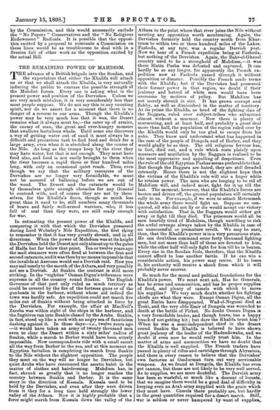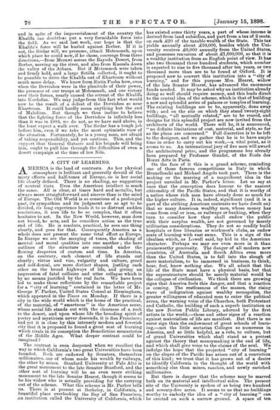THE REMAINING POWER OF MAHDISM. T HE advance of a British
brigade into the Soudan, and the expectation that either the Khalifa will attack us or that we shall attack the Khalifa, is very naturally inducing the public to canvass the possible strength of the Mandist forces. Every one is asking what is the present power and position of the Dervishes. Unless we are very much mistaken, it is very considerably less than most people suppose. We do not say this in any vaunting spirit, nor do we assert for a moment that there is no danger of a reverse to our arms. Though the Khalifa's power may be very much less that it was, the Desert remains what it always must be,—the eater up of armies, the enemy of man, the great and ever-hungry monster that swallows battalions whole. Until some one discovers a way of getting water out of sand it must always be a difficult and precarious task to find food and drink for a large army, even when it is stretched along the course of the Nile. As long as the troops keep by the river they may have water, but that is not enough. They must have food also, and food is not easily brought to them when the river becomes a rapid three or four hundred miles long, with only an occasional quiet reach. Thus, even though we say that the military resources of the Dervishes are no longer very formidable, we must not be accused of hallooing before we are out of the wood. The Desert and the cataracts would be by themselves quite enough obstacles for any General to contend with, and of course they are not by them- selves, for the Khalifa's force, though so much less great than it used to be, still numbers many thousands of brave and fairly well-armed warriors, who, if less full of zeal than they were, are still ready enough for war.
In estimating the present power of the Khalifa, and comparing it with that which the Dervishes possessed during Lord Wolseley's Nile Expedition, the first thing to remember is that it has very greatly shrunk, and in all directions. When the power of Mahclism was at its height the Dervishes held the Desert not onlyalmostup to the gates of Haifa but far below that point. Ten or twelve years ago the mail steamers were often fired at between the first and second cataracts, and it was then by no means impossible that the invalids at Assouan would see a Dervish raid. Now you may sail nearly to the mouth of the Atbara, and very possibly not see a Dervish. At Suakin the contrast is still more striking. lathe "eighties" Osman Digna's tribesmen were supreme in all the country round Suakin. The English Governor of that port only ruled as much territory as could be covered by the fire of the fortress guns or of the gunboats in the harbour, without whose aid indeed the town was hardly safe. An expedition could not march five miles out of Suakin without being attacked in force by the Dervishes. For example, the affair at MacNeil's Zareba was within sight of the ships in the harbour, and the fugitives ran into Suakin chased by the Arabs. Suakin, in fact, stood up like a rock with an angry sea of fanaticism dashing against it. In those days—i.e., twelve years ago —it would have taken an army of twenty thousand men even to clear the Desert within a sixty miles' radius of Suakin, while a march to Berber would have been utterly impossible. Now correspondents ride with a small escort all the way from Berber to the sea, and at this moment an Egyptian battalion is completing its march from Suakin to the Nile without the slightest opposition. The people they meet on the way will no longer be Dervishes, but quiet Arabs who have renounced the ascetic habit in the matter of clothes and hairdressing. Mahdism has, in fact, shrunk so greatly that it no longer reaches the country between Suakin and Berber. It is the same story in the direction of Kassala. Kassala used to be held by the Dervishes, and even after they were driven from it they for a long time held strongly the lower valley of the Atbara. Now it is highly probable that a force might march from Kassala down the valley of the Atbara, to the point where that river joins the Nile without-- meeting any opposition worth mentioning. Again, the Dervishes formerly held the country south from Khar-- toum to within two or three hundred miles of the Lakes. Fasiaoda, at any rate, was a regular Dervish post. Now we hear of a French expedition being at Fashoda,. but nothing of the Dervishes. Again, the Bahr-el-Ghazel country used to be a stronghold of Mahdism,—it was: there Sle.tin Pasha was defeated and captured. It can hardly be so any longer, for apparently the French ex- pedition now at Fashoda passed through it without opposition or disaster. Possibly the French made terms with the Khalifa ; but if the Dervishes had possessed.' their former power in that region, we doubt if their jealousy and hatred of white men would have been overcome by motives of policy. But Mahdism has: not merely shrunk in size. It has grown corrupt and' flabby, as well as diminished in the matter of territory. At its prime the Khalifa, as head of the fighting clan of the Baggara, ruled over subject-tribes who submitted' almost without a murmur. Now there is plenty of murmuring, and at least half, and probably a great deal more than half, the population of the region ruled over by the Khalifa would only be too glad to escape from his yoke. They know and understand what has happened in the case of the people of Don gola and of Berber, and they would gladly be as they. The old religious fervour has, in fact, died out, and a rule which rests plainly upon massacre and mutilation by the Baggara is realised to be the most oppressive and appalling of despotisms. Even the rule of the old Egyptian Pashas seems preferable to that. But though the Baggara are hated, they are still dreaded intensely. Hence there is not the slightest hope that the victims of the Khalifa's rule will stir a finger while he retains power. The men who are longing to be rid of Mahdism will, and indeed must, fight for it up till the last. The moment, however, that the Khalifa's forces are beaten and driven off, the ground population will certainly rally to us. For example, if we were to attack Metemmeh the whole army there would fight us. Suppose we con- quered, all who did not fly or die would accept our victory, with satisfaction. That is, the Baggara would either get away or fight till they died. The prisoners would all be men heartily tired of Mahdism, though unwilling to risk the awful revenge always taken by the Khalifa, in case of an unsuccessful or premature revolt. We may be sure, then, that the Khalifa's power is in a very precarious state. He can doubtless command some forty thousand fighting men, but not more than half of these are devoted to him,. while the other half will only fight for him till he is beaten. Every one in the Soudan feels, therefore, that the Khalifa cannot afford to lose another battle. If he can win a considerable action, his power may revive. If he loses. it, his authority will receive a shock from which it will probably never recover.
So much for the moral and political foundations for the - Khalifa's power. We must next ask, Has he Generals, has he arms and ammunition, and has he proper supplies of food, and plenty of camels with which to move his supplies ? We very much doubt whether his fighting chiefs are what they were. Except Osman Digna, all the great Emirs have disappeared. Wad-el-Negumi died at Toski, and the very able Emir of Dongola was wounded to • death at the battle of Firket. No doubt Osman Digna is a very formidable leader, and though brave, has a happy knack of not getting hit ; but dare the Khalifa trust him ? - When he was a semi-independent chief in the desert round Suakin the Khalifa is believed to have shown great jealousy of the leader of the Hadendowahs, and we - doubt if even now he would really trust him. In the matter of arms and ammunition we have no doubt that the Khalifa is well supplied. The French traders have passed in plenty of rifles and cartridges through Abyssinia, and there is every reason to believe that the Dervishes' own factories at Omdurman turn out very serviceable weapons. As we found at Dongola, the Khalifa has even got cannon, but these are not likely to be very well served. As to supplies, we are more doubtful. The Dervish army, has been so wasteful, so much like a descent of locusts,_ that we imagine there would be a good deal of difficulty in keeping even an Arab army supplied with the grain which they must have. Camels there probably are, but hardlr in the great quantities required for a desert march. Sta., war is seldom or never hampered by want of supplies', and in spite of the impoverishment of the country the Khalifa can doubtless put a very formidable force into the field. As we said last week, our hope is that the Khalifa's force will be hurled against Berber. If it is not, the Sirdar will, we presume, attack Metemmeh, upon which place he could now, if he chose, converge from three directions,—from Merawi across the Bayuda Desert, from Berber, moving up the river, and also from Kassala down the valley of the Atbara. But if Metemmeh were taken and firmly held, and a large flotilla collected, it ought to be possible to drive the Khalifa out of Khartoum without much more delay. We know from Slatin Pasha how, even when the Dervishes were in the plenitude of their power, the presence of our troops at Metemmeh, and our victory over their forces, nearly caused the retreat of the Khalifa into Kordofan. We may judge from this fact what would now be the result of a defeat of the Dervishes so near Khartoum. It could hardly mean anything but the end of Mahdism. But though we thus incline to believe that the fighting force of the Dervishes is infinitely less than it was in 1884, we do not, as we have said above, in the least expect a walk over. The Sirdar has a tough job before him, even if we take the most optimistic view of the situation. Fortunately, he is a young man, not afraid of taking responsibility, and yet cautious. This, and the support that General Gatacre and his brigade will bring him, ought to pull him through the difficulties of even a desert campaign at the time of low Nile.



































 Previous page
Previous page